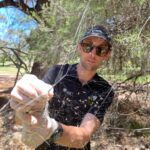Curtin University energy and fuel science expert, Professor Hongwei Wu, is one of eight Australian researchers chosen by the Australian Trade Commission (Austrade) to visit internationally-renowned researchers and facilities in Europe later this year.
Professor Wu will visit four clean energy and biofuels research institutions in Sweden and Finland for a week in November under Austrade’s visiting researcher program.
Chemical Engineer and Deputy Director of the recently established Fuels and Energy Technology Institute (FETI), Professor Wu, said the award provided a unique opportunity to meet with the researchers face-to-face and discuss the future research directions.
“I hope my visit can result in future collaborations with those researchers in Sweden and Finland as the two countries are traditionally very strong in the area of clean energy and biofuel,” Professor Wu said.
“I’m particularly interested in discussing the research projects they are operating, touring their labs and facilities, meeting their research teams and postgraduates, and most importantly discussing the opportunities for collaborations with mutual benefits.”
Professor Wu said the world was facing significant challenges in energy security and sustainable development. He said rural and regional Australian communities were seriously threatened by three key pressing problems; dryland salinity, energy supply and freshwater supply.
“Development of truly sustainable renewable energy technologies to address these threats has significant implications in Western Australia and Australia as a whole,” he said.
“Dryland salinity causes extensive adverse environmental impacts to Australia’s premium agricultural land. One of the key mitigation strategies is mallee plantation, which has already been practiced by the farmers in Western Australia in the last two decades.
“Also, as the by-product of managing dryland salinity to prevent the loss of quality agricultural land, production of mallee biomass has little competition with food production and contributes significantly to the security of food supply.
“Via ‘alley farming’, a system comprising belts of trees and crops sharing a landscape, mallee plantations produce large quantities of biomass for meeting the energy needs of rural and regional Australia. Western Australia alone can produce up to 10 million dry tonnes of mallee biomass per annum at low costs, superb energy efficiency and small carbon footprints.”
Professor Wu said such a large amount of biomass supply exceeded the energy demands of rural and regional communities in the foreseeable future, offering the opportunity to use the excess energy for saline underground water desalination for fresh, local water supply.
“Therefore, biomass can contribute significantly to the sustainable development of rural and regional Australia. The key challenge is to develop advanced utilisation technologies for low-cost production of energy, fuels and power while taking into account the unique features of biomass as a fuel,” he said.
“This is why this area of research is a passion of mine and of critical importance to the greater community.”
Professor Wu’s research focus is in the clean and efficient utilisation of solid fuels, including biomass, coal and wastes. He has led a series of systematic research projects into converting mallee biomass that is bulky, fibrous and of low-energy density into a bioslurry fuel that is of high-energy-density via pyrolysis. The approach breaks through the 5 percent energy substitution limit and enables the substantial uptake of biomass-derived fuels in coal-fired power stations.
Professor Wu is a co-inventor with Professor Chun-Zhu Li of several advanced technologies on solid fuels which are currently patent pending. The FETI research team has also pioneered fundamental research on characterisation of oligosugars in the liquid products derived from the hydrolysis of cellulose/biomass.
The key objectives of Professor Wu’s research are to utilise innovative approaches of both fundamental and practical significance. Since 2004, he has successfully established strong collaborations with key stakeholders in mallee industry including the State Government Department of Environment and Conservation, Oil Mallee Association and Future Farm Industry CRC.
Contacts:
Professor Hongwei Wu, Deputy Director, Fuels and Energy Technology Institute, Curtin University
Tel: 08 9266 7592, Email: h.wu@exchange.curtin.edu.au
Andrea Barnard, Public Relations, Curtin University
Tel: 08 9266 4241, Email: andrea.barnard@curtin.edu.au
Web: http://curtin.edu.au


